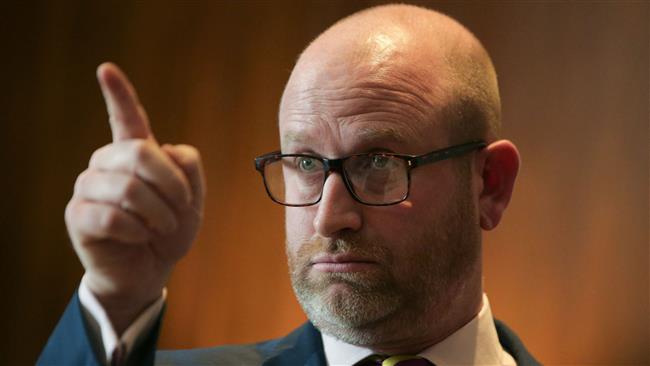UKIP whips up Islamophobia ahead of June election in Britain
The UK Independence Party (UKIP), which campaigned for Britain’s exit from the European Union in the 2016 referendum, is whipping up Islamophobia in the country ahead of the June election.
In an interview with BBC on Sunday, UKIP leader Paul Nuttall said the party will push to ban the burka and sharia courts (Islamic religious courts) in the United Kingdom.
In a surprise move last week, British Prime Minister Theresa May called a snap election to be held on June 8 in order to bolster her position before going into two years of negotiations with the EU about Britain’s departure from the bloc.
Nuttall refused to admit the Eurosceptic party’s policies were targeting Muslims, but went on to say that there were no similar proposals to ban Jewish religious courts in the country.
Nuttall, who had said in 2013 that UKIP would not seek a ban against burka, has now made a U-turn, calling for women wearing face-covering veils in public to be confronted.
“We have a heightened security risk at the moment and for CCTV to be effective, you need to see people’s faces. Because whether we like it or not in this country, there’s more CCTV per head than anywhere else on the planet,” he said. “We’re the most watched and for that to be effective, you need to see people’s faces.”
He added, “This isn’t an attack on specifically Muslims, it’s all about integration.”

“Integration is actually getting worse in Britain at the moment, not better. This will help,” he continued.
There are no Islamic religious courts in the UK, but Nuttall still went on to say that “we have courts or councils in this country where the words of a woman are only worth half that of a man.”
“That has no place in a liberal, democratic functioning Western democracy,” added Nuttall, whose party has only 9 percent of voter support, according to a recent poll.
British Muslims have faced an “explosion” in faith-based hate crimes since the 2016 referendum vote to leave the EU. In March, thousands of people took to the streets in London and other cities to protest against a rise in Islamophobia, racism and anti-refugee motions in the country.
Christ still under the rubble in Gaza, Palestinian pastor says in Christmas message
Israeli occupation forces expand aggression in SW Syria, seize local weapons
Dec. 24: ‘Axis of Resistance’ operations against Israeli occupation
VIDEO | MEK trial in Tehran reveals heinous terrorist crimes
VIDEO | No Christmas in Gaza again
Iran condemns Israel’s brazen admission of Haniyeh murder
VIDEO | Conference in Islamabad explores Pakistan-Iran ties
Hamas condemns Israeli evacuation order of Indonesian Hospital













 This makes it easy to access the Press TV website
This makes it easy to access the Press TV website